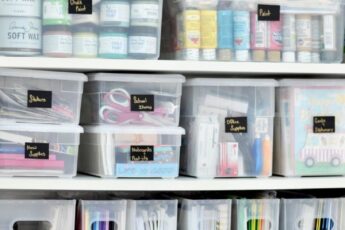Was decluttering front and center on your New Year’s resolution list, but it’s mid-February and you still haven’t started?
It’s the job we all think about after packing away the holiday décor. But let’s be real: decluttering can feel totally overwhelming. How often do we say, “I’ll get to it later” or “I’m just too busy right now”?
But here’s the thing: living with clutter comes at a cost. It doesn’t just mess up your space; it sneaks into your mind and mood, stealing your clarity, motivation, and energy. Let’s break it down:
How Clutter Impacts Your Life
Stress and Cortisol Levels
Did you know clutter can actually stress you out? Research shows people in cluttered spaces tend to have higher levels of cortisol—the stress hormone. A study in Personality and Social Psychology Bulletin found that women who described their homes as “cluttered” felt more stressed and tired. Yikes!
Cognitive Overload
All that clutter overwhelms your brain, making it harder to focus and process information. It’s like trying to multitask with way too much going on, leaving you mentally drained.
Unhealthy Habits
Struggling to find things? That’s clutter causing chaos. It can derail routines like cooking at home or staying on top of exercise and hygiene.
Mental Health Challenges
Living with disorganization can make you feel overwhelmed, embarrassed, or even anxious and depressed.
Decision Fatigue
Clutter overloads your brain with choices, leaving you stuck and unable to decide what to do next. No wonder procrastination happens!
So, yes, clutter is a bigger deal than just being messy. And it’s not entirely your fault—modern life encourages consumerism, bigger homes, and a culture of convenience. But what if we could use Shui principles to take control and create a simpler, more organized life?
Let’s dive in!
Step One: Where Do You Start?
Great question. Your home mirrors your life, and clutter hotspots often align with areas you’re struggling in. Cleaning these spaces isn’t just about tidying up—it’s about clearing out energy blocks to make room for fresh chi (life force energy).
Ask yourself: What’s weighing heavy on me right now? Is it money, health, time, or relationships?
Struggling with relationships? Check your bedroom. Feeling stuck in your career? Take a look at your office. Specific spaces in your home reflect life areas where you need some more TLC.
Here’s a quick guide to the energy living in your home:
- Front Door/Front Entry: Welcomes possibilities, abundance, and good health into your life. If you feel you can’t get traction in life or opportunities are passing you by, this is a great place to start! (Pssst … I tell all my clients to start here, that’s how important it is!)
- Living Room: Reflects family energy, your lifestyle, and how you live day-to-day.
- Kitchen: Nourishment—how you take care of yourself and your family.
- Dining Room: Friendship and community, bringing people together.
- Office: Creativity, money-making, and life’s purpose.
- Bedrooms: Rest, romance, and rejuvenation. It also reflects your focus on self-care. Check out my blog about love, bedrooms and Feng Shui for more info!
- Basement: Represents boundaries and unconscious thoughts.
- Attic: Higher consciousness, spirituality, and ancestral connections.
Take a moment to reflect. Intuitively, you’ll know which area is calling for attention—both in your home and life.
Step Two: Start Small and Build Momentum
Once you’ve chosen your starting spot, don’t try to tackle the entire room at once—that’s a surefire way to feel overwhelmed. Instead, focus on one small area, like a drawer or a closet. Bite-sized wins create big shifts in energy. Complete a couple of these smaller projects, and I promise you’ll start to feel the difference. That boost of fresh energy will motivate you to keep going.
Step Three: Follow the Process
As you work, think about decluttering first, cleaning second and then organizing what’s left. If you struggle with excess, consider each item and ask yourself – “does this reflect or support my vision for the future ?” If not, it’s time to let it go. Sentimental items often remind us of a past identity or emotion we’re not quite ready to release. Honour this but also set firm boundaries. We can become stuck in our attachments, making it harder to move forward.
After editing your things, thoroughly clean the closet, drawer, or shelf. Wipe down surfaces and vacuum. Dirt and dust are low-vibe magnets. A clean space is ready to welcome in new energy and motivation.
For example, if you want to embrace a healthier lifestyle, your kitchen is a key player as it holds the energy of nourishment. Expired food in the fridge and pantry, drawers bursting with unused kitchen utensils, and countertops overflowing with paperwork and your kids’ homework don’t support your new direction—and, in fact, can sabotage your efforts! Creating a clean, functional, organized space is a conduit to fresh energy, and this flow creates positive change.
Final Tips for Decluttering Success
- Don’t declutter too many areas at once. All those items hold old energetic patterns, and when released suddenly, they can create emotional overwhelm and fatigue.
- Set a timer. Give yourself 15-30 minutes per session to keep the process manageable.
- Donate or repurpose. If something no longer serves you but is still useful, give it a second life with someone who needs it.
- Celebrate your progress. Each decluttered space is a win—acknowledge it!
Decluttering isn’t just about organizing—it’s about creating space for new opportunities, better energy, and a more peaceful mind. By incorporating Shui principles, you’re not just tidying up; you’re inviting positive change. So, take that first step today and watch how fresh chi flows into your home and your life!
That’s the HomeHearted way.







Leave a Comment